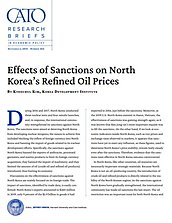Discussions on the effectiveness of sanctions against North Korea are mainly focused on its foreign trade. The impact of sanctions, identified by trade data, is easily confirmed: North Korea’s exports amounted to $260 million in 2019, only 9 percent of the $2.9 billion in goods it had exported in 2016, just before the sanctions. Moreover, at the 2019 U.S.-North Korea summit in Hanoi, Vietnam, the effectiveness of sanctions was gaining strength again, as it was known that Kim Jong-un’s most important request was to lift the sanctions. On the other hand, if we look at economic indicators inside North Korea, such as rice prices and exchange rates observed in markets, it appears that sanctions have yet to exert any influence, as these figures, used to determine North Korea’s price stability, remain fairly steady even after the sanctions. Therefore, evidence that the sanctions were effective in North Korea remains controversial.
In North Korea, like other countries, oil resources are necessarily important strategic materials. Because North Korea is not an oil-producing country, the introduction of crude oil and refined products is directly related to the stability of the North Korean regime. As the sanctions against North Korea have gradually strengthened, the international community has made oil sanctions the last resort. The oil restriction was an important issue for both North Korea and the international community, as some say that China and Russia, permanent members of the UN Security Council and in amicable relations with North Korea, reached an agreement on oil restrictions only at the end.
This research examines how sanctions against North Korea affected the market prices of refined oil products (including gasoline and diesel, the main items under sanctions). According to the analysis, the prices of refined petroleum products traded in North Korea’s marketplaces, though they were temporarily affected by sanctions, remained stable in the long run. This suggests that there has not been much change in long-term supply and demand levels, although there have been short-term fluctuations in oil prices due to behavioral factors for North Koreans, such as hoarding.
If these findings are accurate, this leads to the question of how the market price of refined oil in North Korea remains stable despite the fact that the introduction of refined oil is restricted due to the sanctions. This can be explained by annual reports from the UN Security Council North Korea Sanctions Committee, which estimates the magnitudes of illegal transshipments of refined petroleum products. Although the sanctions have limited the introduction of refined petroleum products, the reports suggest that the amount of refined petroleum products procured by North Korea may not be much different from the amount procured before the sanctions. This does not mean that sanctions are completely useless or ineffective. Energy sources such as oil are directly related to the stability and maintenance of the North Korean regime, meaning that North Korean authorities are likely to be more sensitive to these than to other items. North Korean authorities are seeking to smuggle these core items (including refined petroleum products) despite strong sanctions.
Note:
This research brief is based on Kyoochul Kim, “Finding Loopholes in Sanctions: Effects of Sanctions on North Korea’s Refined Oil Prices,” Korea Development Institute Journal of Economic Policy 42, no. 4 (November 2020): 1–25, http://koreascience.or.kr/article/JAKO202007861294360.page.

